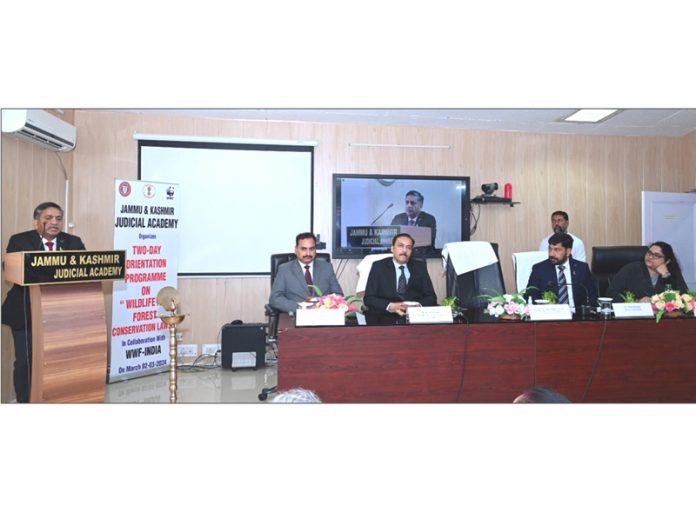Judicial Academy organizes prog on forest conservation laws
Excelsior Correspondent
JAMMU, Mar 2: J&K Judicial Academy in collaboration with WWF-India today organized two-days orientation programme on “Wildlife and Forest Conservation Laws” for Judicial Officers and officers of J&K Forest Department across the Jammu Province.
The programme was inaugurated virtually by Justice N Kotiswar Singh, Chief Justice, High Court of J&K and Ladakh in presence of Justice Madan B Lokur, Former Judge, Supreme Court of India along with Justice Sanjeev Kumar, Chairman, Governing Committee for J&K Judicial Academy and Roshan Jaggi, Principle Chief Conservator of Forest & HoFF.
Dr Saket Badola, CCF Uttarakhand, Dr M K Kumar, Chief Conservator of Forest, Jammu East, Moulika Arabhi, Advisor, Centre for Environmental Law, WWF India, Dr Amit Dubey, Head-Wetlands, WWF India, Tejas Singh Kapoor, Centre for Environmental Law, WWF India and Rohit Rattan, WWF India were also present during the inaugural session.
In his inaugural address, Chief Justice highlighted that environmental degradation is mostly a result of human activities such as deforestation, vehicular pollution and industrialization which has led to environmental pollution and loss of biodiversity. He emphasised that educating the masses about the importance of protecting the environment is an effective way to restore the ecological balance.
“The infrastructural and industrial growth has boosted economy but at the same time air is getting polluted since brick kilns in many districts of J&K are adding to air pollution”, he said, adding “global warming in J&K has led to a change in snowfall patterns and warmer winters, affecting the ecosystem at large”. He laid thrust on striking a balance between economic growth and environmental protection and in this way J&K will stay beautiful, befitting its nickname, Paradise on Earth.
In his special address, Justice Sanjeev Kumar said, “principle of sustainable development is to meet the needs of the present without compromising the ability of future generations to meet their own needs. Thus, the longer we continue to pursue unsustainable development, the more severe will the consequences be”.
He discussed ‘Swachh Bharat Abhiyaan’, a scheme that emphasizes on ushering in a behavioural change among people, for healthy sanitation practices and the importance of it.
Roshan Jaggi, Pr. Chief Conservator of Forests & Chairman Biodiversity Council, in his keynote address, shared details of actions being taken by Forest Department to enhance forest cover, conserve water Resources and protect wildlife. He informed that scale of afforestation has been increased three times in last four years.
Moulika Arabhi, Advisor, Centre for Environmental Law, WWF India gave an introduction of the two-days orientation programme and said, “there is a need of dedicated environmental courts”.
Y P Bourney, Director Judicial Academy presented the welcome address and gave an overview of the programme. He said that J&K although known as heaven on earth for its breathtaking natural beauty, has been facing a multitude of environmental challenges that threaten its ecological health and well-being. He stressed upon the need to take proactive measures and foster collaboration between various stakeholders for preserving its unique natural heritage for the coming generations.
The first session was chaired by M K Kumar, Chief Conservator of Forest, who gave an overview on environmental issues and challenges in Jammu. Dr Amit Dubey, Head-Wetlands, WWF India, who was the resource person for the second session, deliberated on the importance of high-altitude wetlands and their governance.
In third session, the resource person Dr Saket Badola gave an overview on illegal wildlife trade scenarios in India. He said that illegal wildlife trade is a major threat to global biodiversity, driving many species to the brink of extinction.
The fourth session was chaired virtually by Justice Madan B. Lokur, Former Judge, Supreme Court of India and an eminent environmentalist. He underlined that ‘environment’ is a very comprehensive term and is clearly at risk from a variety of reasons, mostly of human origin and in order to tackle this problem it is important to develop strategies for modifying human behaviour towards environmentally benign practices and shun away environmentally damaging ones.


